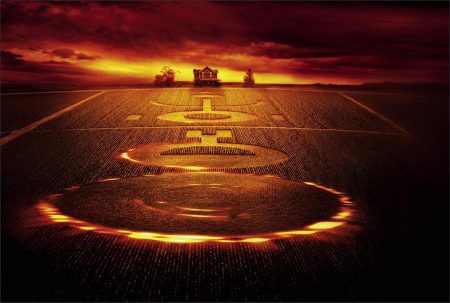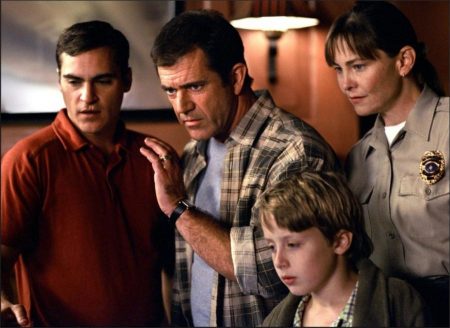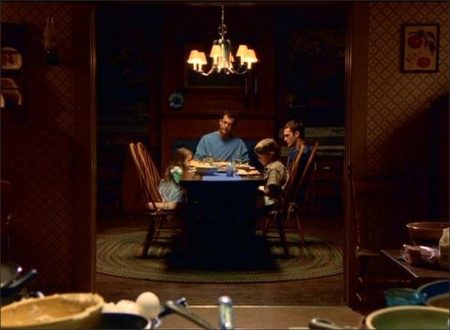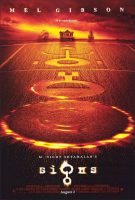Signs Movie Trailer. In Signs, Mel Gibson plays Graham Hess, a Pennsylvania minister who has abandoned his calling after his wife’s death in a senseless car accident. Six months later, Graham awakens one morning to find that portions of the vast cornfields behind his lovely shingled farmhouse have been trampled into curious hieroglyphs, terrifying his children and enraging his dogs.
Is this a prank perpetrated by local hooligans or some kind of supernatural occurrence? When the television news begins to report the existence of similar crop circles in India and then the appearance of mysterious lights in the sky over Mexico City, the question becomes more urgent. Graham’s brother Merrill (Joaquin Phoenix), a former minor-league baseball player, suspects a global conspiracy of nerds, while the ex-minister’s young son, Morgan (Rory Culkin), becomes convinced that the crop formations are omens of an alien visitation.
At first, it seems that ”Signs,” which opens today nationwide, will hinge on the explanation of the phenomenon in Graham’s cornfield. (Just what Graham himself plans to do with all that corn, which looks ready to be harvested, is never explained, since he seems to have neither farm equipment nor hired hands.) But that puzzle, quickly solved, is in any case a red herring, as are the little green men who seem to be sneaking around various parts of the world.
The real question, posed by Graham to his brother at an especially tense moment, is what kind of person Graham (and, by implication, everybody else) is. There are two kinds: those who believe everything happens for a reason and that we are therefore not alone and those who believe that we live in metaphysical solitude, our destinies governed by nothing more than random chance. There are people with faith, in other words (and the point is reiterated frequently), and people without it.
Graham, who made his living as one of the first kind, is now one of the second, and ”Signs,” behind its facade of science-fiction horror, tries to generate a deeper kind of suspense out of his moral crisis. Will he recover his faith in time to rescue what remains of his family? Will he finally understand that the universe is made not of coincidences and inexplicable events but of patterns, portents and signs?
He’d better, since the cinematic universe he inhabits has been constructed by M. Night Shyamalan, for whom nothing happens by accident. While I’m skeptical about this as a general cosmological principle (which I guess makes me a Type 2 person), there is no denying that as an approach to filmmaking the idea has its advantages and its pleasures. Anyone who has seen ”The Sixth Sense” or ”Unbreakable,” Mr. Shyamalan’s two most recent features, will enter ”Signs” with heightened attention, a state intensified by the velvet orchestral stab of James Newton Howard’s opening music.
The film’s title can be taken to refer not only to those curious designs in the corn but also to nearly everything else that is heard and seen. The smallest details and scraps of dialogue shimmer with a mysterious significance that will be revealed, we trust, in another of those rug-pulling surprise endings that are the director’s trademark. Why is Graham’s daughter, Bo (Abigail Breslin), phobic about drinking water? Who is the nervous-looking man the family glimpses one afternoon outside the local pizza parlor?
It’s Mr. Shyamalan, actually, indulging in a bit of Hitchcockery. Like Hitchcock and Steven Spielberg, to whom he’s often compared (the latter this week on the cover of Newsweek), Mr. Shyamalan is a master of control, with a sure grasp of the classical filmmaking lexicon. His suspense sequences build slowly and elegantly, and he is adept at evoking dread through shifting camera angles and careful manipulation of the frame. He knows that what we don’t see is often much scarier than what we do, and for most of the movie the aliens are less a presence than an intuition. We’re not quite sure how to characterize it: does this tingle of anticipation signal the arrival of ”Close Encounters” wonder or ”War of the Worlds” terror?
One name for the belief that everything disguises a hidden intention is paranoia, and Mr. Shyamalan, displaying a sense of humor missing from the rigorous solemnity of his other movies, pokes fun at our dark suspicions even as he shamelessly manipulates them. At one point, Graham’s children make pointy hats out of aluminum foil, supposedly to prevent the aliens from reading their thoughts. (This is silly, though using an old baby monitor to eavesdrop on extraterrestrial radio frequencies apparently makes perfect sense.)
The cast members, too, occasionally shake off the lugubriousness that surrounds them. Mr. Gibson allows a twinkle of wit to shine through his craggy, patriarchal mien, and Mr. Phoenix has a lively, unpredictable ordinariness that blows a fresh breeze of realism into the humid allegorical air. Skillful as he is, Mr. Shyamalan is undone by his pretensions. This has been the summer of sad dads (and also, perhaps not coincidentally, of bad moms, as the writer Moira Redmond recently pointed out in Slate), and ”Signs” follows ”Minority Report” and ”Road to Perdition” in using genre conventions to illuminate a portrait of paternal grief. This is not an unworthy theme, but it is articulated here with a heavy-handed, incoherent sentimentality that smothers real emotion.
Graham has to remind the townspeople (including a sympathetic police officer played by Cherry Jones) that he has taken off the collar, but they call him ”Father” anyway. (One deduces from this that he must be Episcopalian, or perhaps Greek Orthodox.) At an emotional family dinner, Morgan cries out to his dad, ”I hate you,” and a short time later Graham says the same thing to God.
The lesson that ”Signs” imparts — have faith! — is ubiquitous in the culture, from the pronouncements of certain politicians to television shows like ”Touched by an Angel.” (This version might be called ”Mauled by an Alien.”) The movie’s fuzzy pop-spiritualism carries a disturbing implication.
Unless you have faith (in something tactfully left unspecified), it says, you are putting the integrity of your family and the very lives of your children at risk, and you no longer deserve to be called father — as if skepticism, or indeed any but the most literal-minded expression of belief, were a form of child abuse. But Mr. Shyamalan never gives us anything to believe in, other than his own power to solve problems of his own posing, and his command of a narrative logic is as circular — and as empty — as those bare patches out in the cornfield.
Signs (2002)
Directed by: M. Night Shyamalan
Starring: Mel Gibson, Joaquin Phoenix, Rory Culkin, Cherry Jones, Abigail Breslin, Patricia Kalember, Ted Sutton, Merritt Wever, Lanny Flaherty, Marion McCorry
Screenplay by: M. Night Shyamalan
Production Design by: Larry Fulton
Cinematography by: Tak Fujimoto
Costume Design by: Ann Roth
Set Decoration by: Douglas A. Mowat
Art Direction by: Keith P. Cunningham
Makeup Department: Bernadette Mazur, Francesca Paris
Music by: James Newton Howard
MPAA Rating: PG-13 for some frightening moments.
Distributed by: Buena Vista Pictures
Release Date: August 2, 2002
Views: 178






